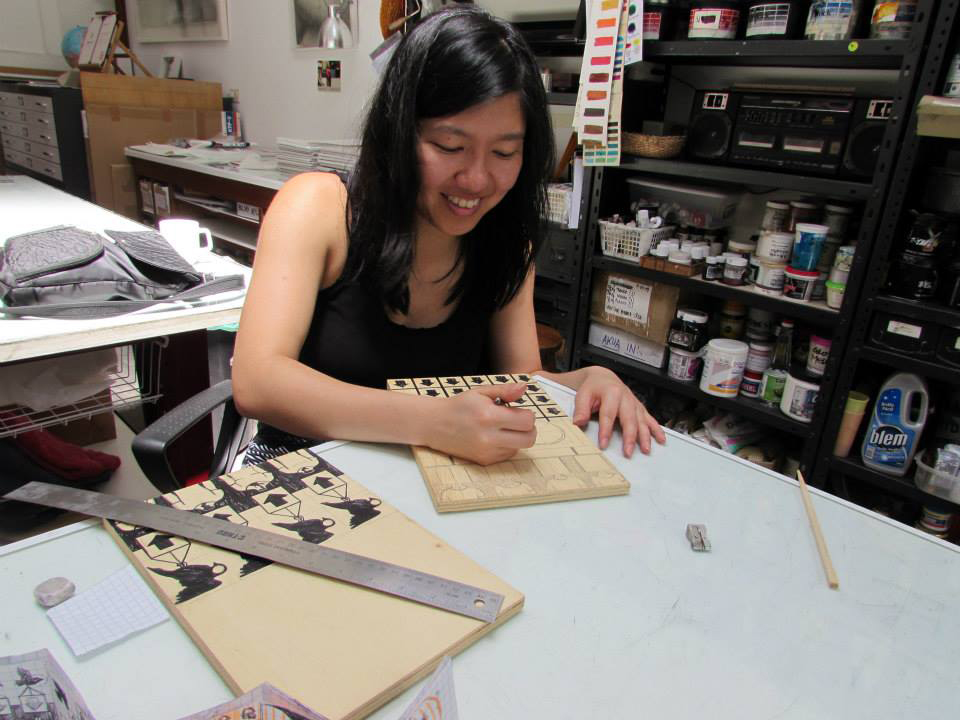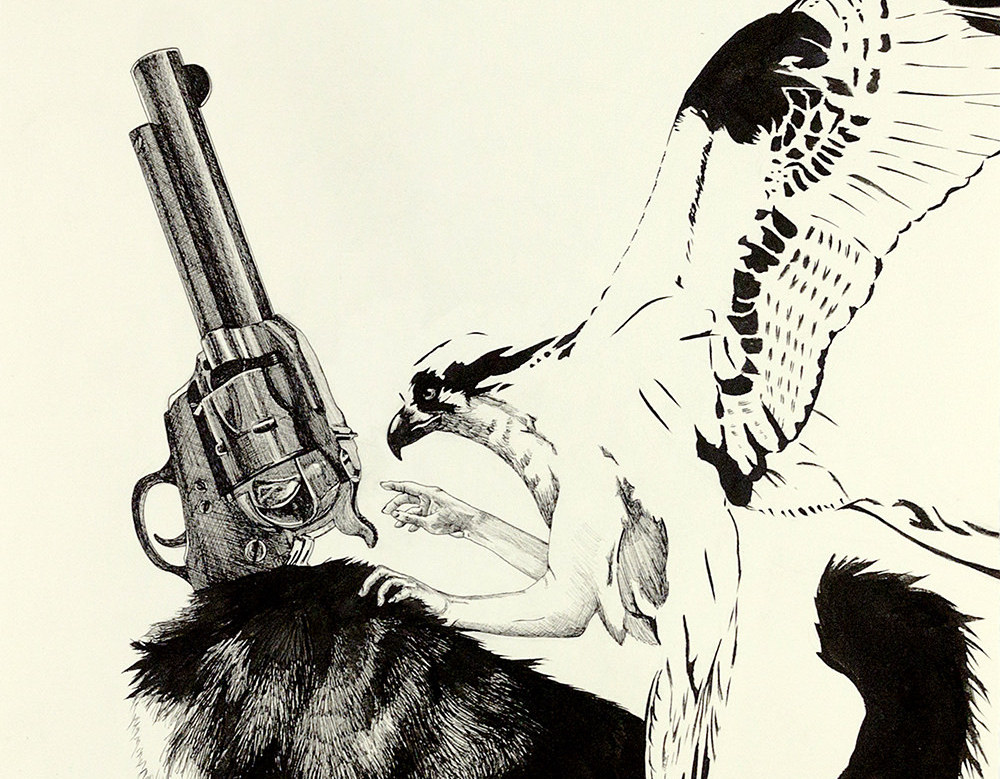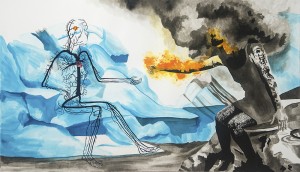August 29th was the one-year anniversary of me leaving my corporate job.
I left to pursue my artwork. On a deeper level, I left to make myself better and more purposeful in any of the work that I do, philosophically and values-wise. I didn’t believe that a traditional job could teach me these things as effectively as I was seeking. I left to pursue opportunities that would help me better understand and define value, the purpose of work, the measures of progress, and the resulting merits of ambition.
It’s been, at times, an unnerving year. A hard, uncertain, and thrilling year, but in other ways an easy, freeing, and powerfully happy one. A year heavy with the enlightenment of learning and play. A year of trial, and ultimately a pursuit of answers that has culminated in harder questions than I started out with.
I’m doing a self-evaluation and goal setting, which I’ll publish soon. And in the process, I’m taking the time to think about my actions following up on what I’ve done and transitioning to what I want to do next.
Today, I’m writing about three events I’m involved with this month, how I decided to participate in them, and the harder questions that my involvement opens up.
depART: Laika Boss, Saturday, September 5, 6 pm-midnight
Laika Boss is a space-themed costume party/experience/group art show/fundraiser for Dane County Humane Society and art projects in Madison put on by the coworking/community space, 100state.
This one’s a no-brainer for why I’m participating. I’ve worked with stray animals and rescue cases my whole life. I’m an artist. I have a special place in my heart for shared spaces, and a coworking/startup hub like 100state resonates with me. The organizers of 100arts have been doing an amazing job and I can tell that participating in this event puts me in a league of smart and passionate people.

Tough Mudder, Saturday, September 12, 11 am
The Tough Mudder is not a race against others, but a personal and team challenge. What an awesome ideal. The obstacle course is as mental as it is physical. It’s a competition wholly against yourself and a challenge that requires you to help and be helped by others in order to complete the course. I basically signed up to spend my day getting muddy with an added adrenaline kick with a great group of friends.
In addition to the camaraderie, the Tough Mudder has been awesome for setting long-term, physical goals. Seriously, what a great way to combat my inner wuss. I’ve hated running most of my life and am now running a minimum of 20 miles a week. I’ve plateaued at three chin-ups (and occasionally squeak out a pathetic fourth that I only mention in hopes of sounding cool), but hey, I could still be doing between 0 and 1 like I was a year ago. Mostly, though, I love having a goal that sets a bar towards which my abilities–and more importantly habits–must rise to meet.
Finally, since its founding five years ago, Tough Mudder has raised $8.5 million for The Wounded Warrior Project, which you can learn about in the video below. Welcome to the power of the collective.
Maker Faire Milwaukee, Saturday, September 26 – Sunday, September 27
“The Greatest Show (and Tell) on Earth.” This is a place where makers of all kinds share what they create and how.
I’ll be helping the UW Milwaukee and MIAD Print Clubs in the Printmaking area. Rumor has it there might be a steamroller for woodblock printing.
You can read a goofy interview of yours truly on the Maker Faire blog series, Meet the Makers, and check out the other features as well. Maker Faire doesn’t fool around when it comes to the people and organizations they bring in. This will be my third year participating in Maker Faire; I love being surrounded by the energy of fellow learners and doers and getting to see the projects borne out of people’s curiosity and passion.

Teaching, creating, community, helping out good causes while bonding with conscientious, ambitious people. What’s not to love?
Band-aids vs Solutions
I can cross-check these activities against my values and all of them will pass. I can ask myself if what I’m doing gives me the kind of worthwhile challenge that I will learn and grow from, and the answer will be yes. I can ask if what I’m doing helps somebody else, and the answer will still be yes. But I am far from earning a gold star (and it has nothing to do with being my own worst critic).
Even though these three events do good for our world, to celebrate our good intentions prematurely comes with a heavy cost. Equal to the danger of analysis paralysis is the kind of under-thinking that results in the over-doing that currently permeates our culture. We tend to lose sight of the underlying causes that create the need for these grassroots efforts and therefore the opportunity to ask a causational question that digs deeper to the pains we truly seek to relieve. There’s a lot of pain here, an infectious disease, and instead of a proper diagnosis and treatment, we’re fighting it with band-aids.
The Underbelly of the Pet Industry and Animal Advocacy
Laika was the first living creature to be launched into outer space, an event that transformed her into a celebrated, national icon. But the story of Laika is dark and illustrates the dilemma of human progress well. She was a stray dog in Soviet Russia, chosen for the mission for her hardiness and even temperament, to prove that we could sustain life in space. In that regard, the mission was a success; but in the “race” to be first, the Soviets cut a lot of corners, and the scientists knew Laika would die on this mission. We also know, now, that the plan to euthanize her peacefully failed, and that she died horribly from extreme overheating. One of the scientists on the project, Oleg Gazenko, later lamented, “The more time passes, the more I’m sorry about it. We did not learn enough from this mission to justify the death of the dog.”
When the real story of Laika’s far from painless death was exposed, it unleashed an outcry from animal rights advocates. This is a dog, not a human; a dog can’t consent to dying on a rocket, and commemorating her with a statue and lots of fan art is a weak consolation prize. Laika is today, at best, an icon of the space race, and at worst, a heavy emblem of our moral failure.
Beyond the emotional weight of the story, let’s look at what pets mean to us in the US in terms of dollars (I want to get into what animals mean to us with the debates surrounding the ethics vs economics of animal testing and the meat industry, but that gets pretty harrowing, so for the sake of focus, we’ll keep to the puppies and kitties).
Americans spend $61 billion annually on the pet industry (only $2.2 billion of that is buying the pet). There are 164 million pets in 62% of American households, and it’s estimated that about 30% are adopted from shelters. About 7.6 million pets enter shelters every year. Meanwhile, the Humane Society of the United States has total expenses of $128 million in an effort to promote animal advocacy, but only 1% of it goes to local shelters, which the HSUS doesn’t dispute. Local shelters rely on–you got it–local donors.
The infinitesimally small amount of national funding for shelters makes me wonder where the rest of the $128 million goes, but that’s small fries compared to the billions spent elsewhere. There are lots of conflicting numbers about pet ownership, but it’s curious that pet ownership has doubled in two decades while spending on them has quadrupled. It’s also curious that various sources report that only 30% of pets in homes are from shelters…but of the 164 million pets, that’s 49.2 million animals, which is waaay more than the 6-8 million that enter shelters each year and the 2.7 million that are supposedly healthy and ready for adoption.
The harder question: Why are our communities pushed to continue holding local fundraisers when the money (and industry) to help these animals is so obviously there?
War and Supporting Our Veterans in the Aftermath of Damage
We live in a world where war is considered a necessary evil, and it is an evil. Remember how our friends at the Tough Mudder have raised $8.5 million to help wounded warriors? Collectively as a nation we have spent $818 billion on the Iraq War alone.
By the way, there are currently about 1.4 million active US soldiers and another 850,000 in reserve. According to Tough Mudder’s website, there will be over 2 million participants in its obstacle courses worldwide just for this year.
The harder question: How have we justified pooling the efforts of more people than we have soldiers to raise 0.00001039% of the funds spent on the Iraq War to help wounded veterans recover, after the damage has been done?
A Culture of Makers and the Miracle & Curse of Manufacturing
This one’s a toughie and I’m not entirely certain at which angle I should approach this. It’s no secret that there’s a lot of strife about jobs getting sent overseas and like any industry, manufacturing is sure to argue its worthiness. The National Association of Manufacturers tells us that manufacturing contributed $2.9 trillion to the US economy. 12 million people in the US are directly employed in manufacturing and collectively earn $930 billion (based on an average employees’ salary/benefits earnings of $77,506), or about 32% of that contribution.
Just talking about manufacturing as one, lump thing is amorphous as fuck. $2.9 trillion is a great number, if all you care about is numbers, but how much of what we make is actually necessary is an ongoing battle between the consumerist and minimalist philosophies. Though I’m partial to this sector because of my work history there, I’m far from the biggest fan of what manufacturing has enabled culturally as exemplified on Black Friday. For those who argue that manufacturing is about job creation, well, then I suppose it depends on the problem you’re trying to solve…

What does this all mean??
The harder question for now: isn’t really a question. I’m just noticing that the $930 billion of wages and benefits for the manufacturing sector is only 1.14 times of the $818 billion spent on the Iraq War. For better or worse, we could go on fighting all other wars and still double manufacturing overhead power and while we’re at it maybe save shit tons of puppies.
The Value of Staying in the Conversation
I wrote about the feral dogs of South America during my recent travels, and how we humans are not so different from them. It says something, that scientists chose Laika for her good demeanor, and that her praise could become her exploitation, no less, in the name of progress.
The Catch-22 is, I wouldn’t be able to distribute any of these thoughts online if we didn’t know it was possible to jettison anything into outer space. Then again, maybe I wouldn’t have anything to contest about human progress if we didn’t kill a dog on a rocket.
As I move forward in my pursuits, I’m thinking about my values and the dialogues I want to be a part of. There is the “good” that I do in the world, and the “evil” that is inseparable from it. As this Vice article elegantly puts it, “Everything you do is unethical, so shut the fuck up…in spite of your best efforts, you’re still ruining the world.”
While I get this article’s point, I disagree with its approach or the idea that in order to live ethically, we either have “to go off the grid” or kill ourselves. We are social creatures, and so our ethics are rooted in the contexts of our communities. They do not grow in temples of isolation or in labs.
I hate war, but I don’t hate that we have people that will not only run through mud pits and electrical wire but actually pay for the privilege to do so–to pool funds for the sake of empowering those that our warring countries have let down.
I hate that we live in a world where our governments pressure us to advance ever faster and kill dogs in the name of conquering “the unknown” and that nowhere along the way, did one voice among all the brilliant minds, stop to contest it. I’m sorry that we have to promote animal rights only because we wronged them in the first place.
I’m sorry about the state of manufacturing and what it has ridden upon our workforce, our education system, and our values. The irony of becoming creators on a mass scale is that our ultimate production has been a society defined by its consumption. I’m sorry that we rely on grassroots efforts to promote creativity, efforts that become platforms for big name sponsors only once what they’re doing is seen as useful. But I’m not sorry for the underlying philosophies that manufacturing proves, if we are willing to look deeper, and understand our incredible human desires both to create and to congregate.
I’m not sorry to be among people who give their time willingly towards a cause, even though they did not create the problem and are far from being the most financially capable of fixing it. Something in our human nature compels us to empower others, though we ourselves may also be broke, broken, and let down.
There is evidence of something really special here.
It says something, that whether people make $10, $20, or $100 an hour they will use their money to make a statement in a currency and social war they will never win. Our community efforts demonstrate that we are not so afraid of loss as we think we are.
The question is, can we separate sentiment from achievement, and recognize that the work towards the first is the obvious, while the work towards the second is not only harder but a battle we’ve barely begun?
It both amazes and troubles me what we are capable of doing and unwilling to do, with our wealth of resources and poverty of distribution. If we are truly becoming a sharing economy, then I’m curious to what extent we are willing to live up to that. I have a lot of questions and few answers, and I think the only thing I have resolved is that this is a dialogue worth being a part of. Perhaps the worst thing that any of us can do is leave the conversation.
To be rid of the abuse of animal and human, to be rid of war, to be rid of the hunger that drives our consumption. These are not overnight fixes, to put it lightly. But I choose, as I believe my community members do, to be an active person, so that I have the opportunity to be among those who are not only capable of speaking up but also keen on asking the hard questions. I hope that those of us who identify as peacemakers today do so with the vision of becoming peacekeepers tomorrow.

There is a quote I like from Rumi, “Yesterday, I was clever, so I wanted to change the world. Today, I am wise, so I am changing myself.”
I can’t pretend that anything I do is more than a drop in a bucket in the face of a wildfire. I can’t pretend that my running benefits anybody other than myself or that my money, my art, and my community involvement is anything more than an expression of my values and personal tastes.
But I can be a one-person paradigm. I can prove that with limited resources and a simple structure of habits, I have not only enough to improve my personal wellbeing, but also enough to share.
I can afford to live in a developed, American city and go out for drinks with friends, so of course, I have the equal time and power to run in 5k charities and volunteer for the community. My question now is if, ideologically, I can make the next step, from the 5k charity mindset to the world that doesn’t need charity. I ask also, if I find myself in the company of others equally willing to step up, to do with less as individuals and to sway the power that the established world holds on us.
We are not so afraid of loss as we think we are, and we all have voices and the time and ability to use them. So long as we act and interact within the everyday world, we can make the choice to see and speak to it more clearly.




